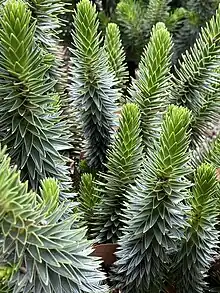Melichrus adpressus
Melichrus adpressus, commonly known as large nectar-heath,[2] is a flowering plant in the family Ericaceae. It is an upright small shrub with whitish-green flowers.
| Large nectar-heath | |
|---|---|
 | |
| Melichrus adpressus | |
| Scientific classification | |
| Kingdom: | Plantae |
| Clade: | Tracheophytes |
| Clade: | Angiosperms |
| Clade: | Eudicots |
| Clade: | Asterids |
| Order: | Ericales |
| Family: | Ericaceae |
| Genus: | Melichrus |
| Species: | M. adpressus |
| Binomial name | |
| Melichrus adpressus | |
Description
Melichrus adpressus is an upright shrub 30–150 cm (12–59 in) high with upwardly, over-lapping, appressed leaves over most of the branch, occasionally toward the base. The leaves are smooth, 15–32 mm (0.59–1.26 in) long, 2.5–5.6 mm (0.098–0.220 in) wide, ribbed on the lower surface, sometimes reddish coloured at the base, margins translucent near the petiole. The cream or yellowish-green flowers are more or less hidden amongst the leaves, corolla more or less cylindrical, 3.8–4 mm (0.15–0.16 in) long, lobes upright, occasional hairs and 2.6–2.8 mm (0.10–0.11 in) long. Flowering occurs from July to September and the fruit is more or less spherical-shaped, about 4 mm (0.16 in) long, green, finely ribbed underneath and smooth at the end.[2]
Taxonomy and naming
Melichrus adpressus was first formally described in 1839 by Augustin Pyramus de Candolle from an unpublished description by Allan Cunningham and the description was published in Prodromus Systematis Naturalis Regni Vegetabilis.[3][4]
Distribution and habitat
Large nectar-heath grows in heath, sandy soils and coastal scrub north of Angourie Point in New South Wales and in Queensland.[2]
References
- "Melichrus adpressus". Australian Plant Census. Retrieved 10 September 2023.
- Powell, J.M. "Melichrus adpressus". PlantNET-NSW flora online. Royal Botanic Gardens Sydney. Retrieved 13 September 2023.
- de Candolle, Augustin (1839). Prodromus Systematis Naturalis Regni Vegetabilis. p. 740.
- "Melichrus adpressus". Australian Plant Name Index. Retrieved 13 September 2023.